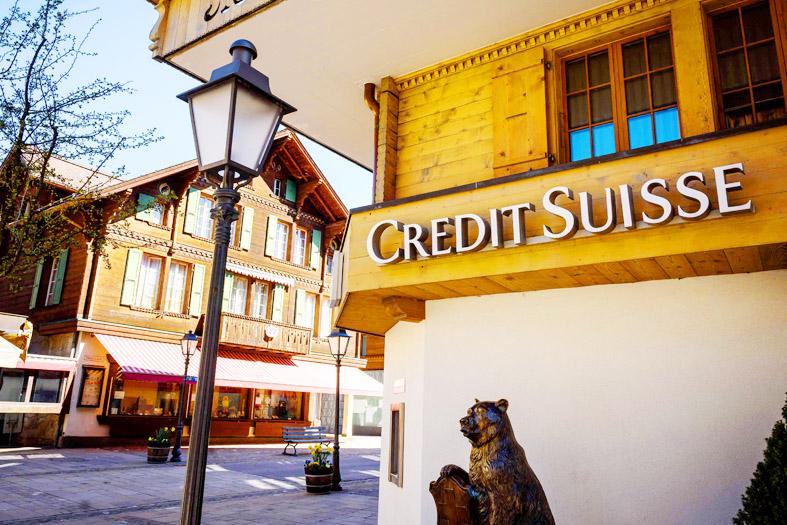Credit Suisse Group AG expects a 600 million Swiss francs (US$655 million) second-quarter hit from Archegos Capital Management LLC’s collapse, it said yesterday, adding to the bank’s woes after a US$4.8 billion blow from the US hedge fund’s collapse and the Greensill Capital Ltd debacle left it nursing large losses, and investors questioning the bank’s strategy and leadership.
The Swiss bank posted a lower-than-expected loss of SF252 million for the first quarter, although it said that it has been asked to add about SF1.9 billion of capital by Swiss regulator FINMA, which is also starting enforcement proceedings against it.
The Swiss bank also said it placed two notes convertible into 203 million shares to strengthen its capital position.

Photo: AFP
Credit Suisse CEO Thomas Gottstein is battling to rescue a terrible start to the year — and possibly his short tenure as CEO — after the bank was hit harder than any other competitor by the collapse of Archegos, the family office of US investor Bill Hwang.
The timing of the blow up could hardly have been worse, coming just weeks after Credit Suisse found itself at the center of the Greensill Capital scandal, when it was forced to suspend investment funds.
The double whammy wiped out a year of profit and left Gottstein fighting to demonstrate to incoming chairman Antonio Horta-Osorio that he is of the right mettle to carry the bank through one of the most difficult periods in its recent history.
In the aftermath of the debacles, the bank replaced investment banking head Brian Chin and chief risk officer Lara Warner, along with a raft of other senior executives, including equities head Paul Galietto and the coheads of the prime brokerage business, which was at the center of the Archegos losses.
The bank also suspended its share buyback and cut the dividend, while leaving investors in the dark on the expected full financial impact of the two incidents.
Last week, Credit Suisse unloaded about US$2 billion of stocks tied to the Archegos blowup in the second such block sale since the bank wrote down the bulk of its exposure in the first quarter and said its exited 97 percent of related positions in the matter.
The Greensill debacle is also far from over. Credit Suisse has so far returned about half the US$10 billion in investor money held by the funds at the time of their suspension.
While the bank marketed the funds as among the safest investments it offered, investors are left facing the prospect of steep losses as the assets are liquidated. Credit Suisse is leaning toward letting clients take the hit of expected losses in the funds, a person familiar with the discussions said earlier this month.
The Greensill incident also led to the head of the asset management unit, Eric Varvel, being replaced and the removal of the business from direct oversight of the wealth management unit.
The impact for Credit Suisse from Archegos and Greensill could add up to US$8.7 billion, JPMorgan analysts Kian Abouhossein and Amit Ranjan said.

When Lika Megreladze was a child, life in her native western Georgian region of Guria revolved around tea. Her mother worked for decades as a scientist at the Soviet Union’s Institute of Tea and Subtropical Crops in the village of Anaseuli, Georgia, perfecting cultivation methods for a Georgian tea industry that supplied the bulk of the vast communist state’s brews. “When I was a child, this was only my mum’s workplace. Only later I realized that it was something big,” she said. Now, the institute lies abandoned. Yellowed papers are strewn around its decaying corridors, and a statue of Soviet founder Vladimir Lenin

UNIFYING OPPOSITION: Numerous companies have registered complaints over the potential levies, bringing together rival automakers in voicing their reservations US President Donald Trump is readying plans for industry-specific tariffs to kick in alongside his country-by-country duties in two weeks, ramping up his push to reshape the US’ standing in the global trading system by penalizing purchases from abroad. Administration officials could release details of Trump’s planned 50 percent duty on copper in the days before they are set to take effect on Friday next week, a person familiar with the matter said. That is the same date Trump’s “reciprocal” levies on products from more than 100 nations are slated to begin. Trump on Tuesday said that he is likely to impose tariffs

HELPING HAND: Approving the sale of H20s could give China the edge it needs to capture market share and become the global standard, a US representative said The US President Donald Trump administration’s decision allowing Nvidia Corp to resume shipments of its H20 artificial intelligence (AI) chips to China risks bolstering Beijing’s military capabilities and expanding its capacity to compete with the US, the head of the US House Select Committee on Strategic Competition Between the United States and the Chinese Communist Party said. “The H20, which is a cost-effective and powerful AI inference chip, far surpasses China’s indigenous capability and would therefore provide a substantial increase to China’s AI development,” committee chairman John Moolenaar, a Michigan Republican, said on Friday in a letter to US Secretary of

Taiwan Semiconductor Manufacturing Co’s (TSMC, 台積電) market value closed above US$1 trillion for the first time in Taipei last week, with a raised sales forecast driven by robust artificial intelligence (AI) demand. TSMC saw its Taiwanese shares climb to a record high on Friday, a near 50 percent rise from an April low. That has made it the first Asian stock worth more than US$1 trillion, since PetroChina Co (中國石油天然氣) briefly reached the milestone in 2007. As investors turned calm after their aggressive buying on Friday, amid optimism over the chipmaker’s business outlook, TSMC lost 0.43 percent to close at NT$1,150